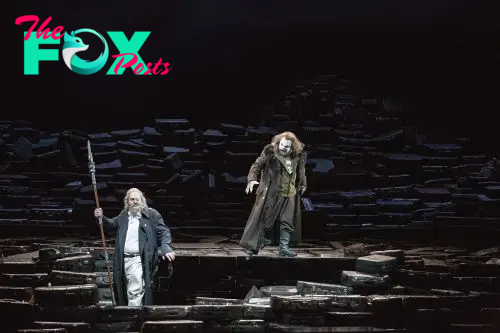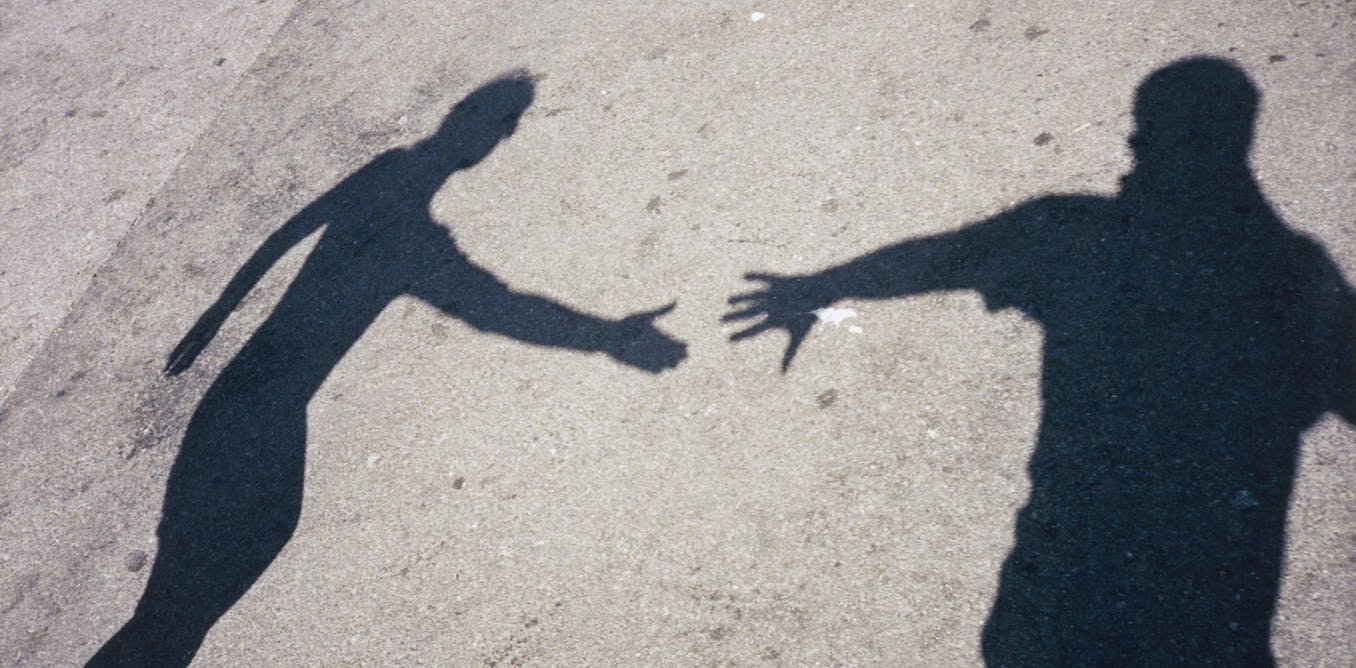Entertainment
Stefan Herheim’s Siegfried at Berlin’s Deutsche Oper Berlin is ok, regardless of a problematic third act – Seen and Heard Worldwide
 Germany Wagner, Siegfried: Soloists, Orchestra of the Deutsche Oper / Nicholas Carter (conductor). Deutsche Oper Berlin, 18.3.2024. (MB)
Germany Wagner, Siegfried: Soloists, Orchestra of the Deutsche Oper / Nicholas Carter (conductor). Deutsche Oper Berlin, 18.3.2024. (MB)

Manufacturing:
Director – Stefan Herheim
Revival director – Philine Tiezel
Set designs – Stefan Herheim, Silke Bauer
Costumes – Uta Heiseke
Video – Torge Møller
Lighting – Ulrich Niepel
Dramaturgy – Alexander Meier-DörzeNBAch, Jörg Königsdorf
Solid:
Siegfried – Clay Hilley
Mime – Ya-Chung Huang
The Wanderer – Iain Paterson
Alberich – Jordan Shanahan
Fafner – Tobias Kehrer
Woodbird – Nicolas Schröer
Erda – Lindsay AMMAnn
Brünnhilde – Ricarda Merbeth
Emblems of the refugees’ arrival but additionally maybe of impending departure, suitcases as soon as once more kind and delimit the set, the rehearsal piano at their centre as soon as once more omnipresent. Wagner’s life and work turns into their very own, our personal. It actually has mine since I first fell below its spell, and regardless of occasional makes an attempt to flee – or not less than to take a break – it by no means works. This Deutsche Oper Ring shouldn’t be serving to in that useless try, a considerably disappointing third act however.
A Ring thriller is what its ring truly does, what its powers truly are. They actually don’t tally with what the characters inform us about it. Should one in some sense consider? Is it a type of theology, as Wagner, eager pupil of Feuerbach, would possibly perceive it? In all probability. At any price, it notably does Alberich’s bidding at first, its yellow gentle targeted on the piano, opening its lid, and thus initiating the Bühnenfestspiel’s ‘second day’. He and Wotan, Schwarz-Alberich and Licht-Alberich, as Wotan-as-Wanderer will name them, watch and wander from the beginning. They aren’t all the time current, but typically they’re. Tellingly, the Wanderer watches the entire first scene from above, and Alberich seems, to Mime’s anger, throughout the second. (Maybe, once more, his brother would possibly even have been in a position to assist him, like Siegfried, just like the Wanderer, however the intelligent craftsman doesn’t wish to know.) Their closing confrontation, not less than onstage, within the first scene of the second act attains a tragic magnificence and import akin to hardly ever, if ever, have I encountered. That once more, is unquestionably partly Nicholas Carter’s doing, proportions of the act as an entire seemingly reconsidered, in order that, like the ultimate act of Die Walküre, ideas of lopsidedness – the so-called ‘Forest Murmurs’ typically overstay their welcome, however not right here – by no means materialise. It’s also certainly that of Stefan Herheim’s staging; the 2, together with vocal-dramatic performances proceed collectively, roughly indivisible (though for the needs of writing, one should begin someplace). The 2 figures are, after all, themselves refugees right here: they’ve stepped ahead, assumed roles; but, just like the boys in Lord of the Flies, nonetheless modified, they have to additionally stay who they have been, albeit inside a special, typically Brechtian framework of storytelling.
Music continues to play its stage function. The place Alberich, in a way, based his enterprise on an instrument he had discovered, or maybe introduced with him, Mime has expanded his endeavours right into a brass workshop, the place devices hold from the ceiling. It’s a barely odd assortment and that, presumably, is the purpose. Mime shouldn’t be an ‘artist’, however a ‘craftsman’; Wagner all the time upheld that Romantic distinction, which immediately colors his creation of Mime and Siegfried. An artist would probably have introduced in another devices. Incapable of shifting past his slim, technical purview, Mime continues to do the identical factor — as, after all, he does in makes an attempt to reforge the sword. Not for nothing in Herheim’s crafty elision of Wagner and Mime (right here, for higher or worse, in striped high) is the ‘Wagner tuba’ a key exhibit. Doubtful tendencies from Wagner reception – a lot as we’d want, we can’t all the time merely ignore them – resurface. Mime’s dwarf-like high quality and huge head certainly provide a nod to unusual claims made regarding Wagner’s peak and (worse nonetheless) physiognomy. Nietzsche would have laughed; the Wanderer does.
The craftsman’s resourcefulness is necessary, although, not less than if it could be harnessed to one thing extra. It’s doable, not less than for Siegfried, to have bellows created from what is offered, in a splendid nod to the unique steam applied Sciences of Bayreuth. Fafner additionally emerges from the suitcases and devices too, brass tooth pretty gleaming, fundamental sheet props and vibrant lighting once more working their wonders for the remainder of his maw. For lighting (Ulrich Niepel) can accomplish a lot, merely but starkly, as in Mime’s silhouette of transient energy, or its prospect, when he holds the Wanderer’s spear. A imaginative and prescient of the world, which Mime, like Alberich nonetheless would ‘win’, is unfurled, once more utilizing what has emerged from the refugees’ possessions.
It’s a pity, maybe, that Siegfried’s look – notably, like that of his father – is so ‘traditionally’ sure as (to us) to appear ridiculous, however that’s certainly deliberate, the failings of ‘heroism’ current from the start. A placing innovation, although, is the return of Siegmund and Sieglinde in a Hänsel und Gretel-like ‘Dream Pantomime’. Siegmund could have rejected the immortality of Valhalla, however there are different methods to return, to information (akin to Mime by no means may). That the Woodbird, a wonderful boy treble (Nicolas Schröer) emanates from this world – a really junge Siegfried, if you’ll – makes a big contribution to the psychoanalytical framework. So too does the dragon’s blood during which he turns into mired and the pitching of look someplace between clown (choosing up from Das Rheingold) and (from Die Walküre) zombie, a disconcerting distinction with contemporary youthfulness of voice.
Carter appeared to supply a presentiment within the first act, which (somewhat than vice versa) on one event appeared very a lot to strategy Humperdinck’s rating. Maybe it was my creativeness, nevertheless it struck me on the time and earlier than I knew what was to come back on stage. His course of the once-again excellent Orchestra of the Deutsche Oper remained deeply and constantly spectacular, each tied to and main the motion onstage. So too did the solid’s performances. Iain Paterson proved a usually considerate Wotan, Jordan Shanahan making a welcome return as an ambiguous clown-Alberich, readable and ‘relatable’ on a number of ranges, with out forsaking the harmful impulse at his core.

Ya-Chung Huang’s Mime was, fairly merely, probably the greatest I’ve seen and heard, turning the Siegfried-Mime axis into a real battle of very totally different tenors, for which Clay Hilley’s tireless Siegfried must also obtain due credit score. Each be taught to conduct, as to play the piano, to steer musically and seemingly in line with the rating, however do they create it to life? That requires the return of the refugees — and discarding of the previous (Walküre) rating. Huang’s means, probably enhanced but solely enhanced by make-up and costume, to play his function as if Mime have been a pupPet-clown, grotesque but additionally human, captured a lot of the function, its uncomfortable points included. Above all, it reminded us of Wagner’s nice achievement in exhibiting us, because the late, enormously lamented Michael Tanner identified, the sheer distress that it’s to be Mime. Tobias Kehrer continued and prolonged his wonderful work as Fafner, that extraordinary final gasp of recognition – ‘Siegfried!’ – given its correct, prophetic, but chilling price. I assume his return to ‘life’, or no matter it was, was as a lot a recognition of the underlying Brechtian concepts because it was of his buying zombie-status, although maybe it was each. The Woodbird’s annoyed waving him away, getting in the best way of the story, was a pleasant contact, however I did ponder whether it may need been higher all spherical to not current the issue within the first place.
What, then, of the third act? Musically, once more, there was a lot to admire, although even in that respect – and maybe extra on account of inextricable reference to stage motion than any precise flaws – it held my consideration much less. There was actually nothing to complain about in Lindsay AMMAnn’s return as Erda, fantastically sung and enunciated, the character, now extra dishevelled, woke up from her sleep and rising as soon as once more from the prompter’s field. Ricarda Merbeth’s shock return, rather than the beforehand marketed Elisabeth Teige, as Brünnhilde could have dissatisfied nobody both. Her radiant efficiency, fairly an achievement given its infamous calls for so late within the night, was fairly the tonic, insofar as one may keep away from distraction, from the occasions round her. For while I can rationalise Herheim’s selections right here, for the primary time I felt somewhat lower than satisfied.
The primary two scenes go largely as they ‘ought to’. No hurt in that, fairly the opposite, and the third appears properly arrange by the now apparently proficient Siegfried summoning Brünnhilde’s mountain and fireplace from the piano. Except, although, I used to be lacking one thing – it will not be the primary time – there may be not far more to it then return of the refugees, their ‘identification’, first amongst simple conventional gender strains, with Siegfried and Brünnhilde, then, taught by the rating (whose ubiquity turns into greater than just a little tedious) and, presumably, additionally by what the 2 principal characters sing, turning extra fluid in orientation and staging an orgy round them. It’s all very effectively accomplished, to the extent of unlucky distraction from the 2 singers, ‘parked and barking’. Once more, I assume that to be the purpose, but it in the end appeared to me misguided. I doubt this was an try to carry up Wagner’s drama as inadequate, or intolerably Romantic. Frank Castorf did so in his Walküre and it proved the weakest a part of his Ring. But Castorf arguably proved most compelling right here in Siegfried, when his conception discovered itself guided by the burden of Wagner’s drama, even maybe by a mediated model of its Romanticism. Is a fundamental Brechtian level about storytelling, ‘enhanced’ by younger folks in white underwear doing their factor, sufficient? There are many locations one would possibly go in Berlin to see the true factor, if that’s what one is after.
It is perhaps tempting to see this ‘drawback’, if drawback or not it’s, as mirroring Wagner’s personal in finishing the Ring. In any case, it was at exactly the identical place, the top of the second act, that he ceased his compositional work on it for twelve years. Turning as an alternative to Tristan und Isolde and Die Meistersinger, he wrote to Liszt that he had ‘led my younger Siegfried into the gorgeous forest solitude; there I’ve left him beneath a linden tree … he’s higher there than wherever else. – If I’m ever to take up this work once more, it should both be made simpler for me, or else I actually should within the meantime make it doable to bestow this work on the world within the fullest sense of the phrase.’ But when Wagner did return to his Siegfried, to the linden tree, or somewhat to the scene that adopted during which all is each modified and resolved, it was nonetheless extra below the spell of Schopenhauer and his musical aesthetics (in addition to his broader philosophy). That, actually, ought to have been proper up Herheim’s road. I shall fortunately eat my phrases if all turns into clear in Götterdämmerung; for now, nonetheless, I register my first notice of dissent.
Mark Berry
-

 Entertainment1h ago
Entertainment1h agoRHOBH’s Mauricio Umansky Replaced a Photo of Kyle Richards on His Desk With One of DWTS’ Emma Slater
-

 Entertainment4h ago
Entertainment4h agoThe Best Internet Memes About Elon Musk’s Tesla Robot
-

 Entertainment4h ago
Entertainment4h agoThe TikTok Duo Behind the Music in Moana 2 on Winning a Grammy and Working With Beyoncé
-

 Entertainment9h ago
Entertainment9h agoGladiator 3 Already in Works, Reveals Director
-

 Entertainment14h ago
Entertainment14h agoHow ‘Interior Chinatown’ Satirises Asians in Hollywood with Witty Social Commentary
-

 Entertainment1d ago
Entertainment1d agoHow to See Ava, Chiang Mai Night Safari’s Golden Tiger
-

 Entertainment1d ago
Entertainment1d agoDictionary.com Names ‘Demure’ as Its Word of the Year for 2024
-

 Entertainment1d ago
Entertainment1d agoAnna Delvey Reunites With Ezra Sosa and Flips Him Off Ahead of ‘Dancing With the Stars’ Finale Return



























